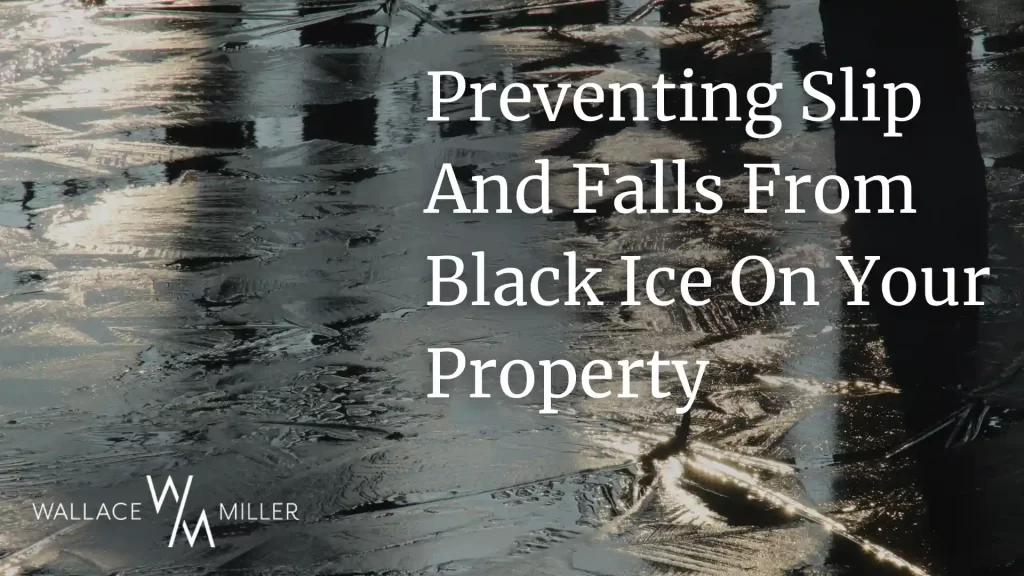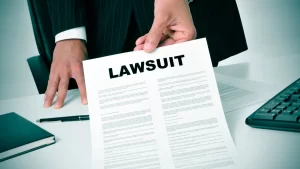Posted on Thursday, February 15th, 2024 at 8:14 pm

As a property owner or manager in Chicago, you have a legal responsibility to maintain safe premises for visitors, even during the challenging winter months. One of the most significant hazards during this time is black ice – a thin, transparent layer of ice that can be nearly invisible and cause serious slip and fall accidents. Knowing your obligations and taking proactive steps to prevent black ice formation can help you minimize the risk of injuries and potential legal liability.
The Dangers of Black Ice
Black ice is a particularly treacherous winter hazard because it’s difficult to see, often blending in with the surface beneath it. This type of ice typically forms when temperatures drop rapidly, causing moisture on surfaces to freeze quickly and create a smooth, transparent layer. Some common areas where black ice may form include:
- Sidewalks and walkways
- Parking lots and driveways
- Stairs and ramps
- Entryways and exits
When a person steps on black ice, they can easily lose their footing and suffer serious injuries, such as fractures, sprains, or traumatic brain injuries. These accidents can result in costly medical bills, lost wages, and other damages for the victim, as well as potential legal liability for the property owner.
Property Management and Winter Safety
As a property owner or manager, you have a duty to exercise reasonable care in maintaining safe premises for visitors during the winter months. This obligation includes taking appropriate measures to prevent, detect, and address black ice formation on your property. Some key steps in effective winter safety management include:
- Regularly inspecting the property for signs of ice formation, especially in high-traffic areas and after weather events.
- Promptly removing snow and ice from sidewalks, parking lots, and other common areas, using appropriate tools and techniques.
- Applying salt, sand, or other de-icing agents to help prevent ice formation and improve traction on surfaces.
- Ensuring proper drainage to minimize the accumulation of standing water that can freeze and create black ice.
- Providing adequate lighting to help visitors identify and avoid potential ice hazards.
- Placing warning signs or barriers to alert visitors of any known or suspected black ice formation.
By implementing a comprehensive winter safety plan and consistently addressing ice hazards, you can demonstrate your commitment to maintaining safe premises and reduce the risk of slip and fall accidents.
Liability for Black Ice on Premises
If a visitor suffers a slip and fall injury due to black ice on your property, you may be held liable if it can be shown that you failed to take reasonable steps to address the hazard. In Illinois, property owners owe a duty of care to invitees (individuals on the property for the owner’s benefit, such as customers) and licensees (individuals on the property for their own purposes, such as social guests).
To prove liability in a black ice slip and fall case, the injured party typically must demonstrate that:
- The property owner owed them a duty of care based on their status as an invitee or licensee.
- The property owner breached that duty by failing to take reasonable measures to prevent, detect, or address black ice formation.
- The breach of duty directly caused the victim’s slip and fall accident and resulting injuries.
- The victim suffered actual damages as a result of the accident.
It’s important to note that liability for black ice accidents can be complex and fact-specific. Factors such as the length of time the ice was present, the property owner’s knowledge of the hazard, and the reasonableness of the owner’s actions may all impact the outcome of a case.
Reducing Slip and Fall Risks in Winter
In addition to implementing a comprehensive winter safety plan, there are several other steps you can take to reduce the risk of black ice slip and fall accidents on your property:
- Educate your staff, tenants, or residents about the dangers of black ice and how to identify and report potential hazards.
- Encourage the use of appropriate footwear with good traction during winter months.
- Consider installing slip-resistant mats or surfaces in high-risk areas, such as entryways or stairs.
- Maintain adequate insurance coverage to protect yourself and your property in the event of a slip and fall claim.
By taking a proactive and diligent approach to winter safety, you can minimize the risk of black ice accidents and create a safer environment for everyone who visits your property.
Slip and Fall on Ice Lawsuits and Settlements
 If you’re facing a slip and fall lawsuit related to black ice on your property, it’s essential to work with an experienced premises liability attorney who can help you navigate the legal process and defend your interests. The potential settlement amounts in these cases can vary widely depending on factors such as the severity of the injuries, the extent of the victim’s damages, and the strength of the evidence against the property owner.
If you’re facing a slip and fall lawsuit related to black ice on your property, it’s essential to work with an experienced premises liability attorney who can help you navigate the legal process and defend your interests. The potential settlement amounts in these cases can vary widely depending on factors such as the severity of the injuries, the extent of the victim’s damages, and the strength of the evidence against the property owner.
In some cases, slip and fall on ice settlements can range from tens of thousands to hundreds of thousands of dollars or more. However, every case is unique, and the outcome will depend on the specific facts and circumstances involved.
Contact a Slip and Fall Attorney Today
Preventing slip and falls from black ice on your Chicago property requires a proactive and vigilant approach to winter safety. By understanding your legal obligations, implementing effective ice prevention and removal strategies, and taking steps to reduce overall slip and fall risks, you can protect your visitors and minimize your exposure to potential liability.
If you’re facing a slip and fall lawsuit related to black ice on your property, the experienced attorneys at Wallace Miller can help. Contact us at (312) 261-6193 for a free consultation and let us put our knowledge and resources to work in defending your interests.
